La Regle De Joue (1939)
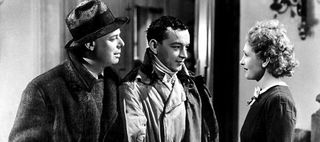
Language: French
The Movie: Jean Renoir both directs and stars in this seminal class-based comedy in which a congregation of self-absorbed aristocrats ends in murder. Bitingly satirical and beautifully shot, it’s polished presentation ensures that Renoir’s unpalatable class criticisms are presented in irresistibly intoxicating packaging. Superior stuff.
A Bit Like: Gosford Park , whose director Robert Altman freely admits to borrowing from Renoir’s classic.
Also See: La Grande Illusion , Renoir’s French forerunner to The Great Escape .
Le Genou De Claire (1970)

Language: French
The Movie: The fifth entry in Eric Rohmer’s Six Moral Tales is the strongest of the series, telling the tale of a holidaying, soon-to-be-married man’s growing attraction towards his host’s young daughter. Boasting a deliciously witty script and a tone dripping with barely-repressed desire, this sexually-charged moral maze is a teasingly illicit treat.
A Bit Like: Cruel Intentions in terms of the sexual challenge that lies at the heart of both films.
Also See: L'Amour l'Après-Midi , the final film in Rohmer’s morality series and another of the better entries.
Les Enfants Du Paradis (1945)
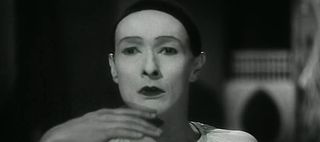
Language: French
The Movie: Marcel Carné’s glossy romantic epic serves as a celebration of post-war liberty, its triumphant tone striking a chord with Parisian punters newly liberated by their fascist oppressors. At the movie’s core is a well-worn tale of unrequited love, but the note-perfect performances from the likes of Arletty and Jean-Louis Barrault as well as the film’s gorgeous look have ensured it has endured as a classic of French cinema.
A Bit Like: There’s Something About Mary , as a beautiful enigmatic young woman sets about breaking the hearts of all she meets, often to hilariously farcical effect.
Also See: Jenny , the first collaboration between Carné and surrealist poet Jacques Prévert, writer of Les Enfants Du Paradis.
Wings Of Desire (1987)
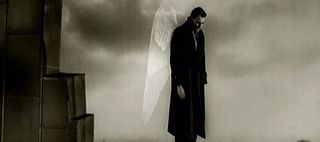
Language: German
The Movie: Wim Wenders’ tender romantic fantasy follows the travails of an angel who assumes mortal form in order to experience the human sensation of love. Poetic and dream-like, it’s a uniquely poetic take on the divided city of Berlin before the wall fell.
A Bit Like: City Of Angels , the loose remake in which the gentle beauty of the original is subbed out in favour of Nic Cage.
Also See: Wenders followed the film with a sequel, Faraway, So Close! , which is worth a look, if not quite on the same plane as the original.
La Haine (1995)
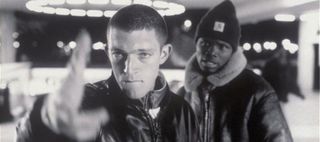
Language: French
The Movie: Matthieu Kassovitz’s unflinching look at the seething underbelly of racially-divided Paris is a snarling pitbull of a film, ripping the sugary coating from the city of love to expose its rotten foundations. A then unknown Vincent Cassel has never been better.
A Bit Like: John Singleton’s Boyz In The Hood is an obvious influence.
Also See: Amelie , in which Kassowitz demonstrates his softer side to delightful effect.
The Wages Of Fear (1953)
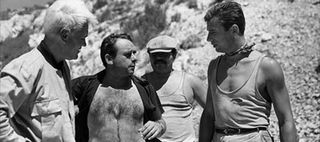
Language: French
The Movie: Oozing machismo from its every pore, this down and dirty thriller from director Henri-Georges Clouzot follows a quartet of reckless Europeans as they navigate a truck full of explosives through the South American jungle in order to extinguish a fire in a remote American-owned oil well. The tension, as you might imagine, is nigh-on unbearable.
A Bit Like: Speed . Although in this case, they probably don’t want to go over fifty unless they absolutely have to.
Also See: Le Corbeau , a nourish thriller famously banned by the French in the aftermath of WW2 for its controversial presentation of the Nazi occupation.
Metropolis (1927)

Language: German
The Movie: Fritz Lang’s silent dystopian nightmare is an eerily disconcerting exploration of capitalism and its inherent problems. Combining a striking array of futuristic imagery with themes that remain relevant today, Lang’s film makes a compelling case that the future may not be all it’s cracked up to be after all.
A Bit Like: I, Robot . Only with sexier robots.
Also See: M , Lang’s first “talkie”, to be discussed in more depth shortly…
Battleship Potemkin (1925)
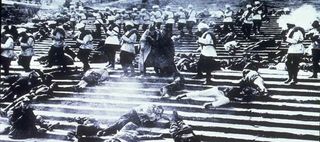
Language: Russian
The Movie: Arguably the most dramatic silent movie ever made, Sergei Eisenstein’s recreation of the mutiny staged aboard the famous Russian battleship is as thrilling a history lesson as you could ever hope to see. The Odessa Steps sequence, though fictional, is the stuff of Hollywood legend.
A Bit Like: The Untouchables , if only for the Odessa Steps homage.
Also See: October , another of Eisenstein’s silent works, this time celebrating the October Revolution of 1917.
The Three Colours Trilogy (1993-1994)
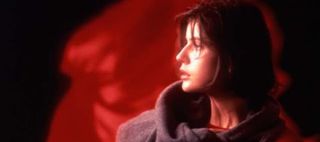
Language: French / Polish
The Movie: Krzysztof Kieslowski’s melancholy trilogy explores the three values embodied by the French Tricoloure, namely liberty, equality and fraternity. The conclusions he draws are unremittingly downbeat, but there’s no denying the films are things of great beauty, thanks in no small part to presence of the ethereal Julie Delpy.
A Bit Like: The Pink Panther , in which Steve Martin turns an expert eye upon the psyche of your average Frenchman.
Also See: The Decalogue , Kieslowski’s 10-part television series in which each episode is dedicated to one of the ten commandments.
Ikuru (1952)
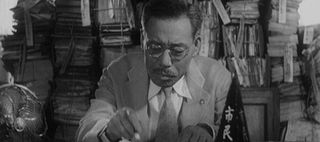
Language: Japanese
The Movie: Ikuru , released two years prior to Seven Samurai , is a wholly different proposition from Kurosawa’s more celebrated epic. The film follows an ageing civil servant with terminal cancer who shakes himself from his self-absorption to put his remaining days on earth to good use. Touching and melancholy, it proves that Kurosawa was a master of more than swordplay.
A Bit Like: The Bucket List . Although Kurosawa’s protagonist is more interested in altruistic deeds than pointless bouts of hedonism.
Also See: Dreams , an exploration of Kurosawa’s own night-time musings which finds the director in whimsical mode.

